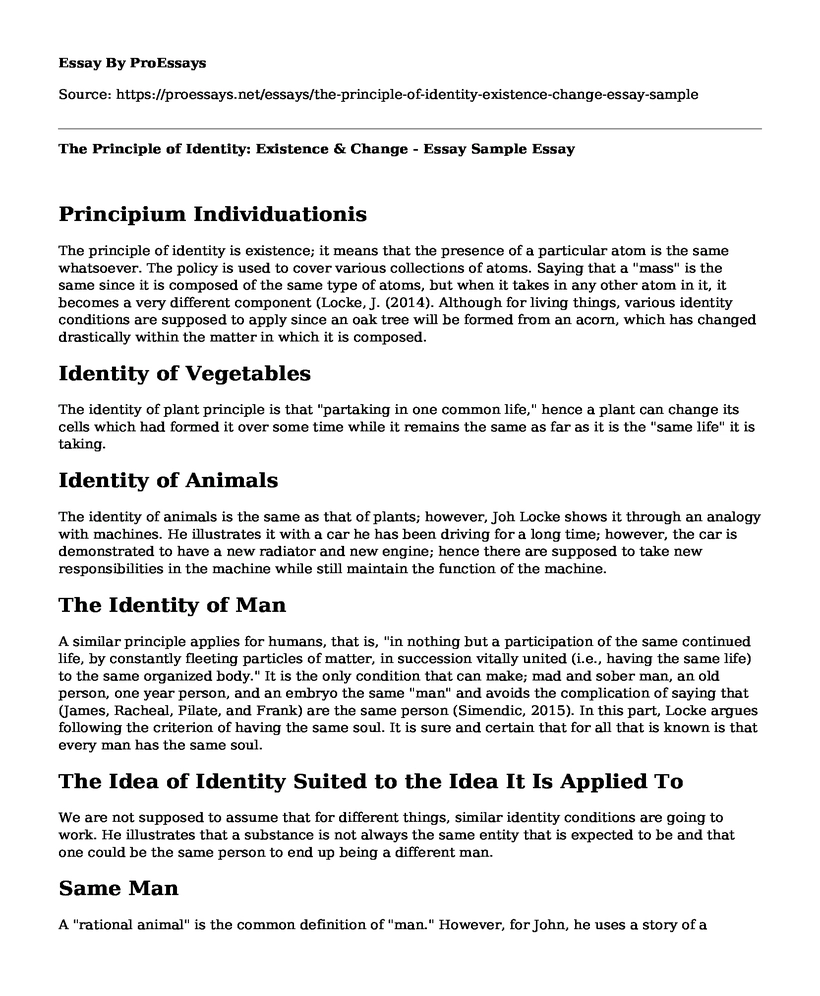Principium Individuationis
The principle of identity is existence; it means that the presence of a particular atom is the same whatsoever. The policy is used to cover various collections of atoms. Saying that a "mass" is the same since it is composed of the same type of atoms, but when it takes in any other atom in it, it becomes a very different component (Locke, J. (2014). Although for living things, various identity conditions are supposed to apply since an oak tree will be formed from an acorn, which has changed drastically within the matter in which it is composed.
Identity of Vegetables
The identity of plant principle is that "partaking in one common life," hence a plant can change its cells which had formed it over some time while it remains the same as far as it is the "same life" it is taking.
Identity of Animals
The identity of animals is the same as that of plants; however, Joh Locke shows it through an analogy with machines. He illustrates it with a car he has been driving for a long time; however, the car is demonstrated to have a new radiator and new engine; hence there are supposed to take new responsibilities in the machine while still maintain the function of the machine.
The Identity of Man
A similar principle applies for humans, that is, "in nothing but a participation of the same continued life, by constantly fleeting particles of matter, in succession vitally united (i.e., having the same life) to the same organized body." It is the only condition that can make; mad and sober man, an old person, one year person, and an embryo the same "man" and avoids the complication of saying that (James, Racheal, Pilate, and Frank) are the same person (Simendic, 2015). In this part, Locke argues following the criterion of having the same soul. It is sure and certain that for all that is known is that every man has the same soul.
The Idea of Identity Suited to the Idea It Is Applied To
We are not supposed to assume that for different things, similar identity conditions are going to work. He illustrates that a substance is not always the same entity that is expected to be and that one could be the same person to end up being a different man.
Same Man
A "rational animal" is the common definition of "man." However, for John, he uses a story of a rational parrot apparently to show that the definition of "man" is extensive. Since even if it were taken to be that rational, a parrot would never be a man.
Personal Identity
A person is defined as an intelligent being, which is cable of thinking that has reflection and reason and can recognize itself as itself. The same reasoning is applied regardless of place and time, which is done through only the consciousness, which is not separable from its reasoning.
Consciousness Makes Personal Identity
The same person can be illustrated through the same consciousness but not the same substance (Nimbalkar, 2011). However, there are times when our consciousness is interrupted, for instance, while sleeping, but this does not mean that we cease to exist at that time; however, we do exist as persons.
References
Locke, J. (2014). Appendix One."Of Identity and Diversity," An Essay concerning Human Understanding.
Nimbalkar, N. (2011). John Locke on personal identity. Men's Sana monographs, 9(1), 268.
Simendic, M. (2015). Locke's person is a relation. Locke Studies, 15, 79-97.
Cite this page
The Principle of Identity: Existence & Change - Essay Sample. (2023, Apr 23). Retrieved from https://proessays.net/essays/the-principle-of-identity-existence-change-essay-sample
If you are the original author of this essay and no longer wish to have it published on the ProEssays website, please click below to request its removal:
- Nietzsche's Philosophy
- Bacon and Plato on Knowledge
- How Gender Roles Affect One's Social Experiences and Personal Identity
- Identity During the Gezi Protests Essay
- Ethics in Immigration Bans and Deportation Essay
- Homelessness & Morality: A Moral Analysis - Essay Sample
- Free Report Example on Striking Effect







